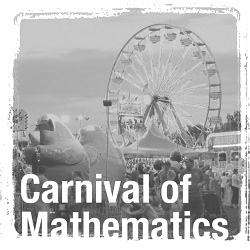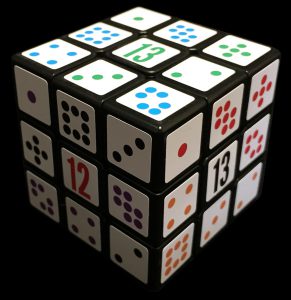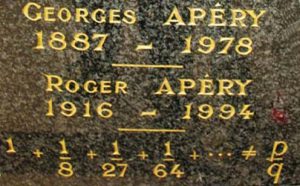We all know mathematicians are the coolest people on the planet. But it turns out that of all the people not on the planet, all of them are in fact either mathematicians, or have mathematical backgrounds or training. Astronauts – and Russian cosmonauts – are all super mathsy people, and if they weren’t already awesome enough, this really seals the deal for me.
You're reading: Features
Carnival of Mathematics 145
 Welcome to the 145th Carnival of Mathematics, hosted here at The Aperiodical.
Welcome to the 145th Carnival of Mathematics, hosted here at The Aperiodical.
If you’re not familiar with the Carnival of Mathematics, it’s a monthly blog post, hosted on some kind volunteer’s maths blog, rounding up their favourite mathematical blog posts (and submissions they’ve received through our form) from the past month, ish. If you think you’d like to host one on your blog, simply drop an email to katie@aperiodical.com and we can find an upcoming month you can do. On to the Carnival!
“I own more maths books by Martin Gardner than by women, is that bad?”
Today is International Women’s Day, so we’ve taken a moment to think about the woman mathematicians in our lives.
We each have fairly sizeable collections of maths books, which prompted CLP to wonder how many of them are by female authors. A quick scan of our respective bookshelves later, here’s what we found.
The maths of the Grime Cube
 Not content with already having five cubes named after him, internet maths phenomenon James Grime has now developed a new Rubik’s cube-style puzzle for internet maths joy merchants Maths Gear. I’ve been slightly involved in the development process, so I thought I’d share some of the interesting maths behind it.
Not content with already having five cubes named after him, internet maths phenomenon James Grime has now developed a new Rubik’s cube-style puzzle for internet maths joy merchants Maths Gear. I’ve been slightly involved in the development process, so I thought I’d share some of the interesting maths behind it.
Another name for a Rubik’s cube is ‘the Magic Cube’ – and Dr James Grime wondered if you could make a Magic Cube which incorporates its 2D friend, the Magic Square.
A more equitable statement of the jealous husbands puzzle
Every time I use the jealous husbands river crossing problem, I prefix it with a waffly apology about its formulation. You’ll see what I mean; here’s a standard statement of the puzzle:
Three married couples want to cross a river in a boat that is capable of holding only two people at a time, with the constraint that no woman can be in the presence of another man unless her (jealous) husband is also present. How should they cross the river with the least amount of rowing?
I’m planning to use this again next week. It’s a nice puzzle, good for exercises in problem-solving, particularly for Pólya’s “introduce suitable notation”. I wondered if there could be a better way to formulate the puzzle – one that isn’t so poorly stated in terms of gender equality and sexuality.
Apéryodical: Roger Apéry’s Mathematical Story
This is a guest post by mathematician and maths communicator Ben Sparks.
Roger Apéry: 14th November 1916 – 18th December 1994
100 years ago (on 14th November) was born a Frenchman called Roger Apéry. He died in 1994, is buried in Paris, and upon his tombstone is the cryptic inscription:
\[ 1 + \frac{1}{8} + \frac{1}{27} +\frac{1}{64} + \cdots \neq \frac{p}{q} \]

Apéry’s gravestone – Image from St. Andrews MacTutor Archive

Roger Apéry – Image from St. Andrews MacTutor Archive
The centenary of Roger Apéry’s birth is an appropriate time to unpack something of this mathematical story.
Integer Sequence Reviews: A075771, A032799, A002717
It’s been almost two years since I last sat down with my friend David Cushing and did what God put us on this Earth to do: review integer sequences.
This week I lured David into my office with promises of tasty food and showed him some sequences I’d found. Thanks to (and also in spite of) my Windows 10 laptop, the whole thing was recorded for your enjoyment. Here it is:
I can only apologise for the terrible quality of the video – I was only planning on using it as a reminder when I did a write-up, but once we’d finished I decided to just upload it to YouTube and be done with it.